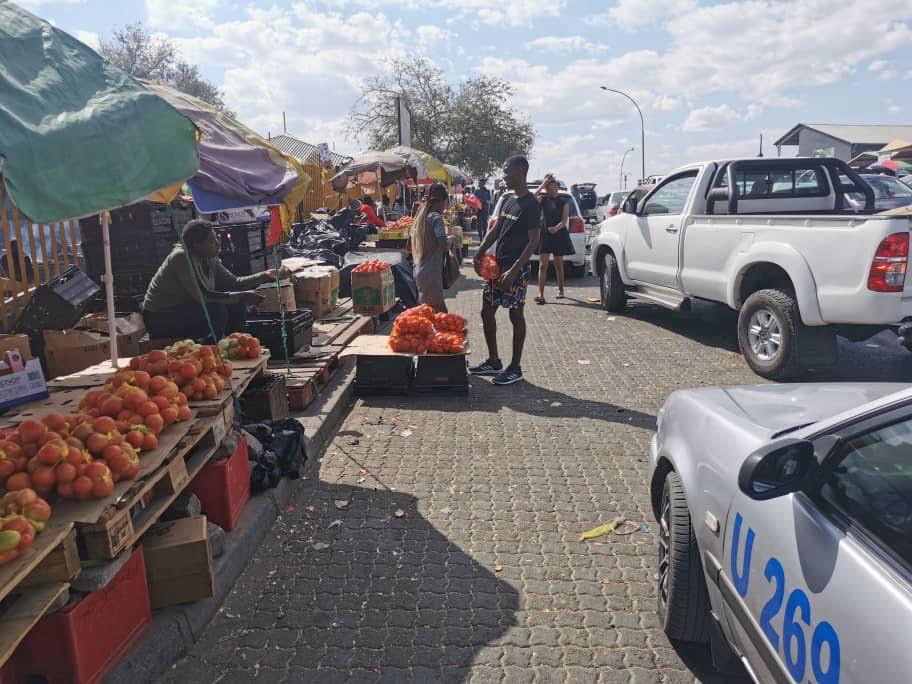
By: Annakleta Haikera
As dawn breaks over Rundu, hundreds of women are already making their way into town, balancing baskets of vegetables on their heads or hopping into cabs to secure a trading spot.
By the time the sun rises, the streets are alive with the rhythm of trade.
According to figures from the Rundu Town Council, there are 641 registered street vendors in the town, with women making up the majority.
Most sell vegetables such as tomatoes, onions, spinach, and other greens, often at affordable prices ranging from N$5 to N$10 per bundle.
Rundu Town Council spokesperson Benjamin Makayi confirmed these statistics.
Assessment by The Villager Newspaper shows that street vendors wake up as early as 5 a.m., often walking long distances from their homes to secure an area with enough foot traffic to set up at in town.
Moreover, many of the women contacted are single mothers who rely on street trading as their main source of income to feed their families and send their children to school.
Many vendors source their produce from nearby areas such as the Sikondo Green Scheme and Salaam in Kaisosi, before selling it in town.
Vegetable vendors have become some of the main offtakers of local fresh produce for many farmers and distributors.
According to the latest Namibia Statistics Agency (NSA) report, Kavango East now has a population of 218,421, with the majority living in urban areas. The report also shows that more women than men are heading households in the region, with 116,111 females compared to 102,310 males.
For many vendors, street vending is not just a business; it’s a survival strategy.
“I leave home when it is still dark. I walk almost five kilometres from Tuhingireni so I can arrive early and get customers. Even if I make just N$100, it helps me buy bread and send my child to school,” narrated Maria Kudumo, who sells tomatoes and onions.
Beatrice Muhepa, who sells spinach, cabbage, and carrots, explained how local green schemes support her business with supplies. She indicated that she also procures her bulk spinach at Salaam or Sikondo.
“If I sell twenty bundles in a day for N$5 each, I might go home with N$100, which I use for food and other basic needs. But when business is slow, it’s very hard,” she shared.
Another vendor, Helena Muronga, expressed pride in her work despite the challenges.
“My mother taught me to wake up early and work hard. Selling vegetables is about more than money; it’s about dignity. Even as a single mother, I am able to feed my children and ensure they go to school,” she remarked.
Rundu mayor, Gabriel Kanyanga, told The Villager Newspaper that the council continues to work closely with vendors to ensure satisfactory organisation and hygiene in the markets.
“We understand the challenges these women face. That is why we are exploring ways to create more designated trading areas and improve access to water and sanitation,” Kanyanga said.
He also expressed concern that many street vendors prefer selling their goods outside shops or moving around town, rather than using the three designated open markets: Sauyemwa, Rundu, and Kehemu.
“We have repeatedly encouraged vendors to make use of the open markets, where operating fees are significantly lower,” Kanyanga explained.
Vendors selling at open markets pay around N$25, while those stationed outside shops are often charged N$50 by the town council to secure a spot, provided the shop owners allow them to set up there.
Kanyanga added that the town council has identified vendors who are officially registered and is working to help them access better trading spaces.
“We are looking at ways to assist them in selling their products in proper and more convenient places,” he stated.
The town of Rundu boasts approximately 4,700 registered businesses, ranging from small-scale street vendors to medium and large enterprises.
These businesses contribute significantly to the local economy and provide vital services and employment opportunities, reflecting the entrepreneurial spirit of Rundu residents.









